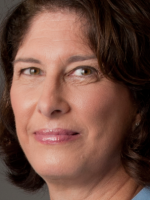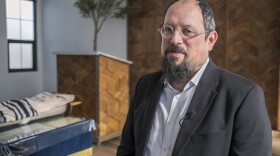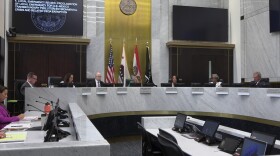STEVE INSKEEP, host:
So we're less than a month from Election Day. Control of Congress is at stake. And there are about eight U.S. Senate races now considered too close to call. The one between Virginia Senator George Allen and former Navy Secretary Jim Webb was never expected to be that close. Last night, in Richmond, the two participated in their last televised debate of the campaign.
NPR's national political correspondent Mara Liasson reports.
MARA LIASSON: The moderator of the debate, Russ Mitchell of CBS News, turned to Senator Allen and got right to the point.
Mr. RUSS MITCHELL (CBS News Anchor/Debate Moderator): You had a 16-point lead in this race, now suddenly, a statistical tie. What do you think happened?
Senator GEORGE ALLEN (Republican, Virginia): Oh, the campaign got off on things that were not issues, that were not ideas, not proven solutions and a record of performance. Some of it, I brought on myself. Some of it was just smears in the campaign.
LIASSON: Since the macaca incident and the allegations that in the 1970s he regularly used a racial slur to describe African-Americans, Allen has been trying to shift the focus of the race away from character questions and back to issues he feels more comfortable with. So during last night's debate, he attacked Jim Webb for wanting to cut and run in Iraq, raise taxes, and allow captured terrorists to file lawsuits. At one point, the two men were allowed to ask each other questions, and their testy exchange reflected the tone of the entire campaign.
Sen. ALLEN: Do you know how many people are benefiting from the tax cuts that you have criticized?
Mr. JIM WEBB (Democrat, Gubernatorial Candidate, Virginia): Did you know that you put 100,000…
Sen. ALLEN: You don't know.
Mr. WEBB: …more people on the street? Did you know that? How can you vote to raise your own pay, four times, to the tune of more than $30,000 and vote four times not to raise the minimum wage?
Sen. ALLEN: I have voted three times to raise the minimum wage but unfortunately, your friends - Hillary Clinton, John Kerry, Ted Kennedy, and others - obstructed that measure, although we…
LIASSON: Allen has also attacked Webb for a 1979 magazine article, where Webb argued against admitting women to the U.S. Naval Academy. Last night, Webb said he was comfortable with the role of women in the military today, and he pointed to the opportunities for women he created during his tenure as Navy Secretary. Webb attacked Allen for blindly supporting the Bush administrations, as he put it, 97 percent of the time.
Mark Roselle is a professor of public policy at George Mason University. He says for the next four weeks, the challenge for Allen is to move away from all the allegations about his behavior.
Professor MARK ROSELLE (Public Policy, George Mason University): The problem for George Allen is this campaign has been all about George Allen for the past two months, and it's all been negative.
LIASSON: Roselle says Webb has been a bit like an innocent bystander; rising in the polls while Allen wounded himself again and again. But if Allen succeeds in quieting all the controversies, then Roselle says, Webb would face what could be an even bigger challenge.
Professor ROSELLE: Right now, Jim Webb stands as the anti-George Allen candidate. And he has benefited a great deal from all the negative publicity surrounding George Allen for the past two months. But I think from here on, Jim Webb has to make a positive case as to why he should be senator. And he has to convey what he would do for Virginia in the next six years, why he would be a better senator than George Allen.
LIASSON: Last night's debate was the last face-to-face encounter between the two candidates. Over the next month, the two parties will be pouring millions of dollars into Virginia - Republicans, to defend a seat they never thought they had to fight for, and Democrats, to take advantage of an opportunity they never expected.
Mara Liasson, NPR News, Washington. Transcript provided by NPR, Copyright NPR.






